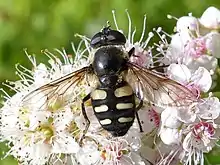| Sericomyia transversa | |
|---|---|
 | |
| Scientific classification | |
| Domain: | Eukaryota |
| Kingdom: | Animalia |
| Phylum: | Arthropoda |
| Class: | Insecta |
| Order: | Diptera |
| Superfamily: | Syrphoidea |
| Family: | Syrphidae |
| Genus: | Sericomyia |
| Species: | S. transversa |
| Binomial name | |
| Sericomyia transversa (Osburn, 1926) | |
| Synonyms[1] | |
| |
Sericomyia transversa (Osburn, 1926), the Yellow-spotted Pond Fly , is an uncommon species of syrphid fly observed in northeastern North America.. Hoverflies can remain nearly motionless in flight. The adults are also known as flower flies for they are commonly found on flowers, from which they get both energy-giving nectar and protein-rich pollen. The larvae of this genus are known as rat tailed maggots for the long posterior breathing tube.[2][3][4][1][5][6]
References
- 1 2 "Sericomyia transversa Report". Integrated Taxonomic Information System. Retrieved 2019-09-23.
- ↑ Rotheray, G.E. (1993). "Colour Guide to Hoverfly Larvae (Diptera, Syrphidae) in Britain and Europe" (PDF). Diperists Digest. 9: 155.
- ↑ Skevington, Jeffrey H (2019). Field Guide to the Flower Flies of Northeastern North America. ISBN 9780691189406.
- ↑ Skevington, J. H.; Thompson, F. C. (2012). "Review of New World Sericomyia (Diptera: Syrphidae), including description of a new species" (PDF). The Canadian Entomologist. 144 (2): 216–247. doi:10.4039/tce.2012.24.
- ↑ "Sericomyia transversa". GBIF. Retrieved 2019-09-23.
- ↑ "Sericomyia transversa species Information". BugGuide.net. Retrieved 2019-09-23.
This article is issued from Wikipedia. The text is licensed under Creative Commons - Attribution - Sharealike. Additional terms may apply for the media files.